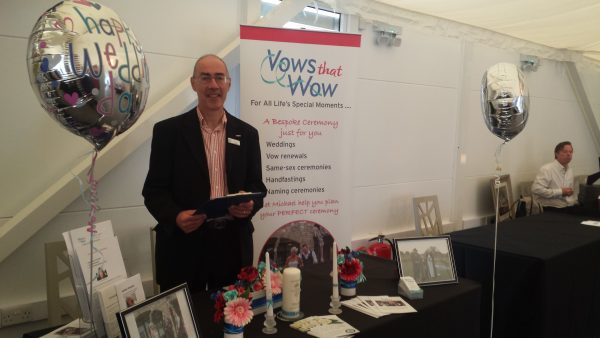
by Michael | Jan 9, 2018 | Blog
January is always a good time for decisions. They don’t just have to be resolutions to lose weight, stop smoking, go dry, or the like. They can be very big ones, like getting engaged
I often exhibit at Wedding Fayres in January, where I have the pleasure of meeting doe-eyed, often rather bewildered couples, who are floating on air after a recent engagement.

What you probably should not do
Newly-engaged couples who attend a Fayre have not necessarily come to the right place (at least, not at the right time). Of course, a Fayre offers a wide range of ideas and suppliers, but it can all prove very overpowering.
How to get started
The first thing you must do, if newly-engaged, is to sit down and choose a date (preferably, at least a year ahead, if it’s in season). You must also decide on whether the ceremony will be religious, part-religious or secular.
Then the budget will have to be settled on and you must agree what part (if any) parents are to play in the planning.
The formal bits
Next, you will need to get the bureaucracy started. If it’s a church wedding, you will need to see your vicar to arrange the banns and the actual date of the service. For any other sort of service, you will need to contact the Register Office and also arrange a celebrant. If you are marrying in a licensed premises, the registrars will come to the venue (for a price); otherwise, you go to their office by appointment.
Venue and Suppliers
Obviously, the venue will have to be booked soon, as will some suppliers like photographers. What sort of entertainment are you going to lay on? A DJ? A live group? Catering will have to be considered. Guest lists can’t be started early enough! When will you contact the florist? Are you going to have a wedding planner, perhaps? What about the clothes for the day? Make-up?
Numerous questions. … and many lead on to others. (For example, catering: do you have a cash bar? Do you offer vegan (say) options ?
Clearly, you should start planning early on, so you have time to arrange things like these.
How do you choose your supplier and venue?
Your venue search may start with the internet, but nothing can replace an actual visit. You will normally be able to meet the wedding co-ordinator, and, if you come prepared, you can ask plenty of questions. Most importantly, you will get a feel for the atmosphere of the venue, and that is so important.
Suppliers (and possibly venues) are best chosen by word-of-mouth. If somebody has worked with them already, they will be able to vouch for the supplier’s professionalism, ability and pleasantness.
If you can’t find a recommendation, testimonials on the website will give a clue (though not much more than that, necessarily). It is best to have a chat on the phone or, better, face-to-face, and you may have a feel for whether they are going to be right for you.
Come what may, you have embarked on an incredibly exciting – though potentially challenging – journey. Buckle your seat-belt on and love the ride!
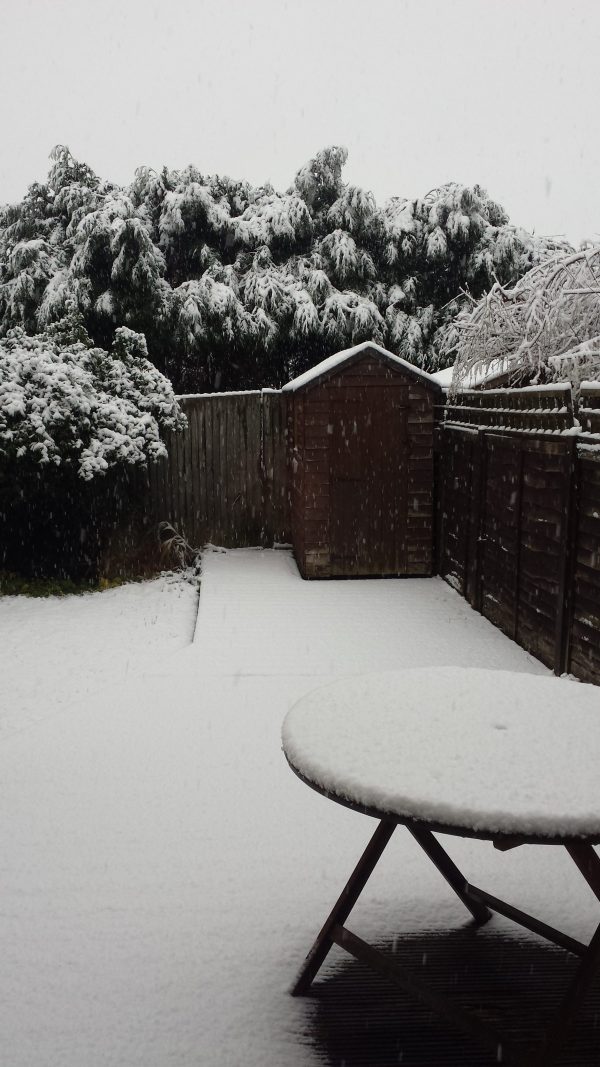
by Michael | Dec 12, 2017 | Blog
With the snow coming down unseasonably hard in Harrow as I write, my thoughts turn to wedding weather. Not unreasonably, I suppose.
The weather can make such a difference …
So what arrangements can you make, if inclement weather looks like ruining your big day?
Clearly, it will make a difference whether your ceremony will be held outdoors, or not. The amount of warning you may have about dodgy weather may also play a part. If it’s a freak storm, you may be taken completely by surprise.
One wedding I took was meant to have begun at 5.30 (when it was very sunny and warm). Unfortunately, it couldn’t actually begin till 7.00 p.m., and the rain bucketed down. Nobody could have foreseen that.
All we could do was to borrow a parasol, so that at least the couple were protected!
Eventualities
If you’re using the garden of a private venue, say, there may be the possibility of going inside. The owners will appreciate maximum warning, of course, and there may be problems of space etc. Your guests will accept a little discomfort in the circumstances!
Should you (or, rather, the venue) be providing chairs, it may be possible to get the venue staff to dry them off just before everyone arrives (although that doesn’t solve the problem of continuous rain!).
If there isn’t that option, you simply have to grin and bear it. It will help a little bit, if your celebrant can add a bit of humour to the proceedings, but it may not be as fun as you would hope. However, with sufficient warning, you may be able to prepare umbrellas for your guests (and for the couple!). And once you’re wet, you’re wet …!
Maybe you know that it’s likely to be really muddy. Then you might want to warn people by e-mail (or even do so in the original invitation, especially if it’s a winter wedding). High heels may not be a great idea. A venue might be able to lay down some matting, or whatever, for the ceremony area.
If it’s freezing, unless you can lay on some hot water bottles, you will have to rely on people being sensible enough to come prepared.
For an outdoor winter wedding, it makes sense that, when you prepare the service with your celebrant, you aim at a reasonably brief ceremony. Another factor is that wind may make it very hard to hear what is going on. I did a Vow Renewal at Stonehenge last year. It was wonderful, but I was glad that it was a only a small ceremony, as the incessant wind presented real challenges to my vocal cords!
Good weather!
I ought to mention fine weather weddings (even in this country!). Especially if it’s a hot spell, organise shade, if you can – and water – for guests at outdoor weddings. Parasols may be a possibility.
Attitudes
Every wedding has its professional moaners, however beautiful and faultless it may be. Accept it! But realise that the vast majority of people will NOT blame you for the rain, snow, wind or sun, and will actually take Acts of God in their stride. Do what you can to mitigate stormy weather, and enjoy what you can.
At the very least, it may be a day that you and your guests never forget!
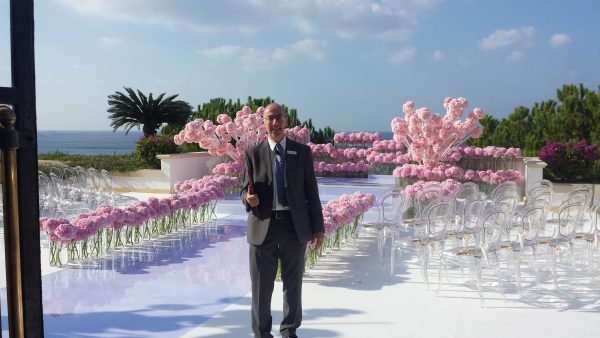
by Michael | Nov 14, 2017 | Blog
A destination wedding sounds such a wonderful idea – and it is!

It’s an exciting prospect. Sun, blue skies, the sea, the works … Why wouldn’t you go weak at the knees at such a dream?
However, it is easy to forget that there are a few practicalities to take into account.
I don’t claim to be a travel agent. They are the experts in this field. However, I can start you off with a few givens that you will need to consider: flights, access to the wedding venue, guests, accommodation, catering, and so on. Not to mention budget or destination preferences. But I defer to the experts here.
The Ceremony
Where I am much more experienced, as a professional Civil Celebrant, is the ceremony itself. If you’re going to travel miles to marry in an idyllic or significant spot for you, you’re not going to want the ceremony to be an anti-climax or disappointment.
There are various options open to you:
- There may well be a celebrant on the spot that you can use. The hotel can often supply one. How good they will be is open to question. You won’t have met them before, so they’ll conduct the ceremony of their choice (standard for everyone, with just the names changed) and there may be no rapport between you. There may be language difficulties too. Of course, they may be professional enough, but using one can constitute quite a gamble.
- You can take a celebrant from the UK along with you. When you’re buying the flights for your family and friends, you add the celebrant’s fare, and pay for a night’s accommodation (or two, if the return flight isn’t convenient), transfers and meals. The advantage of this is that you will have worked with them in the UK and prepared exactly the service you want, which they will conduct for you. They are professionals. You can relax.
- One of the bridal party may be able to conduct the ceremony for you. You’ll save money that way, but will this officiant do a good job? Most people are not naturals at presenting. They are unlikely to be able to reach the standard of a professional civil celebrant. They may want to help you out, but they may be much happier enjoying the ceremony as a bystander, rather than having to endure stress.
Home alone?
Whichever of the above options you prefer, what about the friends and family you cannot take with you, but who would love to celebrate with you and share your happiness? Have you thought of having a wedding blessing (call it what you will) when you return to the UK? You can book the venue of your choice, the bride can still wear white, you can have bridesmaids, a best man and a procession, the tone will be as formal as you want, you may include ritual (religious or not), you can hold a certificate-signing photo-opportunity – in short, the whole ceremony can, to all intents and purposes, be a full wedding.
So consider what is important to you. Some will be happy to be married by an Elvis lookalike in Las Vegas; others will want something more serious. It’s all good, as long as you get what you want.
But if you’re looking for a memorable, meaningful ceremony – whether at your destination or in the UK afterwards – think about using a civil celebrant . With their advice and guidance, you can enjoy that unique ceremony that reflects your personalities and beliefs, and which will be everything that you want it to be.
Do contact Michael (+44 (0)7931 538487) to discuss this further.
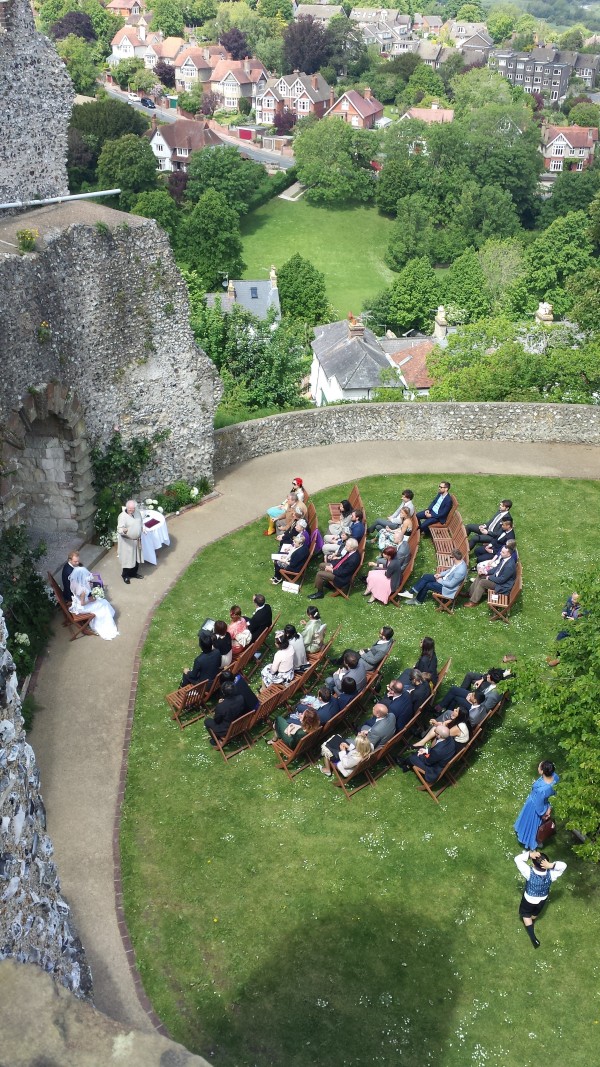
by Michael | Jul 10, 2017 | Blog
Getting a few things straight
Don’t assume the ideal venue for your big event is just there for the taking. For a start, it may not be available on the day. And it might cost more than you anticipate.
So you may only be able to approximate to “ideal”. Probably before anything else, you’ll need to look at your budget.
I can’t sort your finances out for you. You may well want a castle or The Ritz, but they won’t come cheap. You may have to give up on a dream. (There may find wonderful substitutes, though, once you’ve done some research.)
So this article assumes that you accept budgetary limitations.
Ceremony and/or Reception
The other thing to get straight, from the start, is where you actually hold your wedding (or other) ceremony.
You may go from the church (say) to another venue (like a hotel) for the reception.
A lot of people prefer to keep the travel arrangements simple, or prefer a secular (or only part-religious) service. Licensed premises (licensed for weddings!) will tick both boxes. You can arrange for registrars to come and do the legal bits, and then glide seamlessly through to the next part. (That could be a civil celebrant- led personalised ceremony and/or canapes and drinks etc.)
Old Sarum is a wonderful setting for a handfasting!The third possibility is potentially most exciting. You can have the ceremony exactly where you want it (your imagination can run riot!), provided you get permission, of course. So you go (by appointment) to your local Register Office with two witnesses and get legally married. Any time after that, you go up your mountain, visit Stonehenge, mooch by your favourite canal, come into your parents’ back garden, or wherever, with your civil celebrant, and have the ceremony of your dreams.
Naturally, unless you hold this in a restaurant or hotel, you will still have to consider catering.
Choosing your Venue
Depending on your choices above, my venue suggestions would be based on personal recommendation, websites and Google to help you narrow down your search. Then, with your partner, arrange a visit, making sure you get shown round by the event planner.
Go and see a couple of possible of venues, and bear in mind that different weather conditions on the day(s) may unfairly influence your choice!
What you need to find out
Bring a list of questions with you, and write down the answers, in case you forget them later when you’re comparing notes. Naturally, you want to know the cost, but also check exactly what you get, and do not get, for the price. You may have certain requirements (eg “Can I bring in a florist from outside?” or “Can you arrange kosher catering?”) – don’t be afraid to ask.
Parking, catering, decoration, disabled access, bar, toilets, PA system, signage, choice of rooms, setting up the entertainment, buffet or silver service are all issues you are likely to need to discuss. Will the wedding planner (or deputy) be available on the day itself? How much deposit is required, and when must the balance be settled?
If the planner seems adaptable and genuinely willing to put herself out, then that looks good. Do you like her, and would you feel confident working with her?
What is also paramount is your feel for the place. Does it excite you? Do you really want to go there? If you’re lukewarm about the venue, then maybe you should look elsewhere.
If all this sounds like a lot to take in and get done, then bear in mind that you should be starting this process at least a year before the big day. Also consider that this is potentially the biggest day in your lives, and the venue can make or break it. It’s not a choice to be made lightly.
I’m always willing to help and advise, so do have a chat with me about any of the issues this article may have raised.
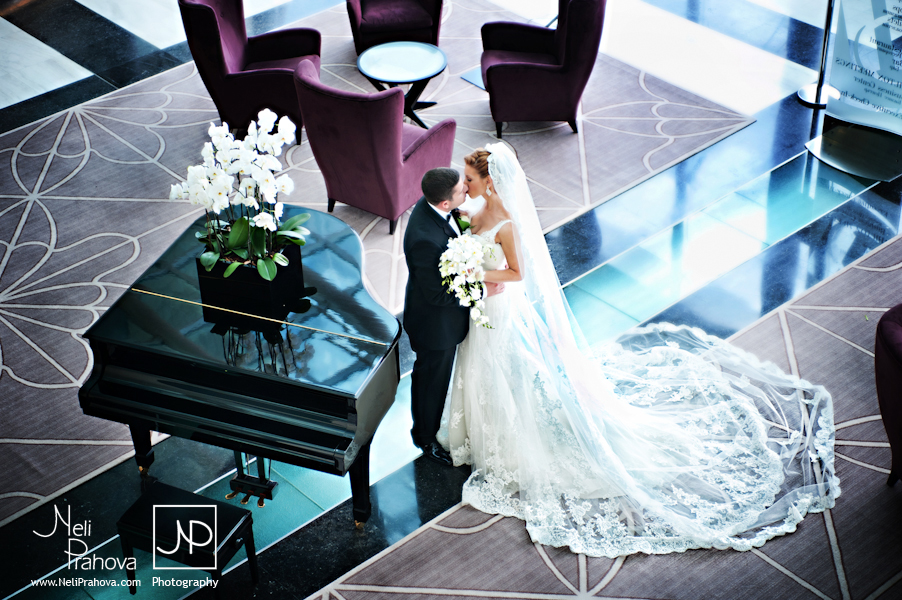
by Michael | May 15, 2017 | Blog
Wedding music is a huge area, and oh, so important.
Music touches emotions. It is atmospheric and can set the tone for the whole ceremony. As a celebrant, I am quite often asked if I have any thoughts about music (even for funerals, by the way). I certainly have my opinions, but it really goes down to what sort of ceremony you will be having (ie the tone, degree of formality etc.) and the sort of music you actually like.
So plenty of generalising and sitting on the fence for Michael now!
When do you want music?
There may be music in the middle of the service, but most commonly you expect it at the beginning and at the end. To be more precise, for maybe a quarter of an hour before the bride arrives, and then for the processional. If there is certificate signing at the end, music could be played, and it’s almost obligatory for the recessional.
Live or recorded?
Recorded music critically depends on the apparatus functioning correctly. Things can go wrong for live musicians too, of course, but they are probably better placed to sort things out. Live performers may well cost more than, say, the DJ who is already going to do your reception. However, I feel that live music has the edge when it comes to conjuring up an atmosphere.
Traditional or Modern?
If you are having a big, traditional ceremony, then you may well opt for the trusted works, like Mendelssohn’s “Wedding March” or Pachelbel’s “Canon”. They are absolutely fine, but you don’t need to raid the classical repertoire for suitable music.
Pop songs or ethnic music have their place at many weddings. It all depends on the tone, of course. Youngsters may appreciate Adele’s “Make You Feel My Love”, or “Circle of Life” or Bruno Mars’ “Just the Way you are “.
Choice
The other obvious element for a couple to consider is their own personal taste. They need to agree on whatever is to be played, and they need actually to like the music! (There’s little point choosing it, otherwise.) If it’s a personalised ceremony, then the music can reflect the personalities of the pair.
However, think carefully before you organise loud rock music blasting out to a room full of middle-aged aunties! A little moderation may work wonders!
It possibly doesn’t need saying that, while the entry music can be reflective, the recessional should be upbeat.
It’s worthwhile carefully weighing up the various pros and cons, and deciding what matters to you. Once you know the degree of formality you are expecting, choose music that you love or that means something to both of you. Then you’ll be well on the way to inspiring a wonderful atmosphere for your big day.
And that is precisely what the right music can provide.
For more advice, feel free to contact Michael.







